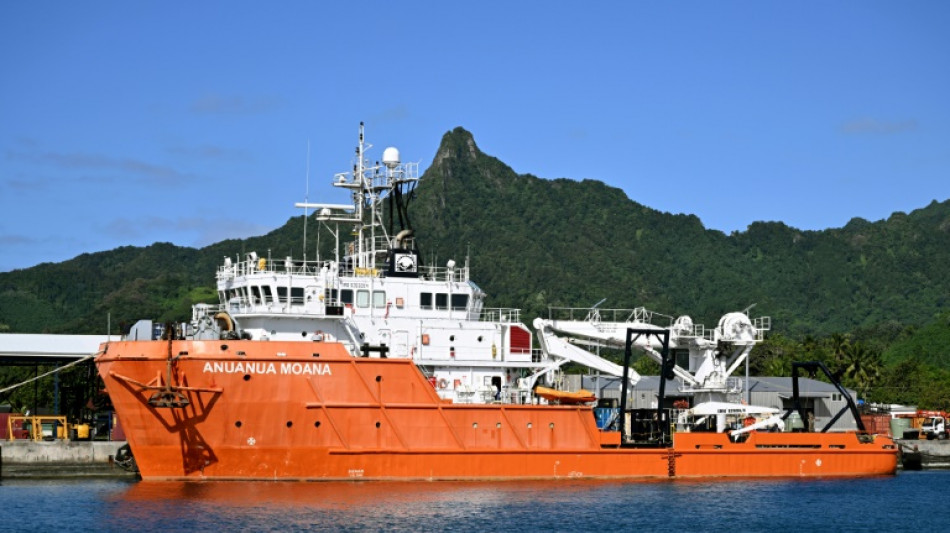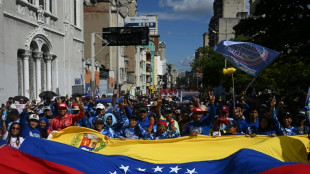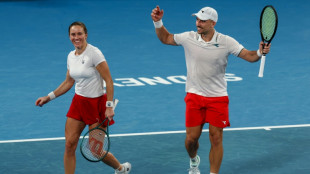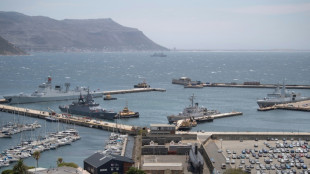
-
 Rallies across US after woman shot and killed by immigration agent
Rallies across US after woman shot and killed by immigration agent
-
Egypt dump out holders Ivory Coast as Nigeria set up AFCON semi with Morocco

-
 Rosenior salutes 'outstanding' start to Chelsea reign
Rosenior salutes 'outstanding' start to Chelsea reign
-
Maduro loyalists stage modest rally as Venezuelan govt courts US

-
 Byrne late penalty fires Leinster into Champions Cup last 16 after 'ding-dong' battle
Byrne late penalty fires Leinster into Champions Cup last 16 after 'ding-dong' battle
-
Rosenior makes flying start as Chelsea rout Charlton in FA Cup

-
 Rallies across US against shooting of woman by immigration agent
Rallies across US against shooting of woman by immigration agent
-
Salah closer to AFCON glory as Egypt dethrone champions Ivory Coast

-
 O'Neil ends 'crazy three days' with Strasbourg cup canter
O'Neil ends 'crazy three days' with Strasbourg cup canter
-
Mitchell leads Cavs over T-Wolves

-
 O'Neil ends 'crazy few days' with Strasbourg cup canter
O'Neil ends 'crazy few days' with Strasbourg cup canter
-
Argentina wildfire burns over 5,500 hectares: governor

-
 Byrne late penalty fires Leinster into Champions Cup last 16
Byrne late penalty fires Leinster into Champions Cup last 16
-
Roma beat Sassuolo to close in on Serie A leaders Inter

-
 Villa's FA Cup win at Spurs leaves Frank on the brink
Villa's FA Cup win at Spurs leaves Frank on the brink
-
Osimhen focused on Nigeria glory not scoring record

-
 Undav calls shots as Stuttgart thump Leverkusen
Undav calls shots as Stuttgart thump Leverkusen
-
Venezuelan prisoners smile to hear of Maduro's fall

-
 Thousands of Irish, French farmers protest EU-Mercosur trade deal
Thousands of Irish, French farmers protest EU-Mercosur trade deal
-
Kiplimo captures third straight world cross country title

-
 Osimhen leads Nigeria past Algeria into AFCON semi-finals
Osimhen leads Nigeria past Algeria into AFCON semi-finals
-
US urges fresh talks between Syria govt, Kurds after deadly clashes

-
 Weekend of US protests after woman killed by immigration agent
Weekend of US protests after woman killed by immigration agent
-
Monaco cling on with 10 men to avoid French Cup shock

-
 Rooney close to tears as brother masterminds FA Cup history
Rooney close to tears as brother masterminds FA Cup history
-
Semenyo scores on Man City debut in 10-goal rout of Exeter

-
 Villarreal sink Alaves to stay in La Liga hunt
Villarreal sink Alaves to stay in La Liga hunt
-
Bristol, Glasgow reach Champions Cup last 16

-
 Freiburg beat 10-man Hamburg to climb to eighth in the Bundesliga
Freiburg beat 10-man Hamburg to climb to eighth in the Bundesliga
-
Venezuela loyalists to rally one week after Maduro's capture

-
 Syrian authorities transferring Kurdish fighters from Aleppo to northeast
Syrian authorities transferring Kurdish fighters from Aleppo to northeast
-
Football: Five memorable FA Cup upsets

-
 Odermatt warms up for Winter Games with Adelboden giant slalom win
Odermatt warms up for Winter Games with Adelboden giant slalom win
-
Benin showcases culture with Vodun Days

-
 Iran crackdown fears grow as protests persist
Iran crackdown fears grow as protests persist
-
Odermatt wins Adelboden giant slalom for sixth World Cup success of season

-
 Holders Crystal Palace stunned by Macclesfield in biggest ever FA Cup shock
Holders Crystal Palace stunned by Macclesfield in biggest ever FA Cup shock
-
Odermatt wins Abelboden giant slalom for sixth World Cup success of season

-
 Poland reach United Cup final despite Swiatek loss to Gauff
Poland reach United Cup final despite Swiatek loss to Gauff
-
India's Gill calls it 'destiny' after shock T20 World Cup snub

-
 'Driven' Vonn storms to 84th World Cup win in Austrian downhill
'Driven' Vonn storms to 84th World Cup win in Austrian downhill
-
Syrian army says stopping Aleppo operations, but Kurds deny fighting over

-
 Thousands of Irish farmers protest EU-Mercosur trade deal
Thousands of Irish farmers protest EU-Mercosur trade deal
-
Vonn storms to 84th World Cup win in Austrian downhill

-
 Anger over fatal Minneapolis shooting fuels US protests
Anger over fatal Minneapolis shooting fuels US protests
-
New rallies erupt in Iran as crackdown fears grow

-
 Real Madrid not 'kamikaze' with Mbappe health: Alonso
Real Madrid not 'kamikaze' with Mbappe health: Alonso
-
South Africa defends naval drills with Iran, Russia as 'essential'

-
 Alcaraz beats Sinner in sold-out South Korea exhibition match
Alcaraz beats Sinner in sold-out South Korea exhibition match
-
'Racing against time': Death toll rises after Philippines trash site collapse


International treaty protecting world's oceans to take effect
A multinational treaty to protect vast expanses of the world's oceans is finally set to become law in January 2026, with environmentalists hailing its enactment Friday as crucial to safeguarding the marine ecosystems.
The move by Morocco and Sierra Leone to join the UN treaty on the high seas clinched the threshold of at least 60 ratifications needed to enact it as international law.
The law aims to protect biodiverse areas in waters worldwide that lie in waters beyond countries' exclusive economic zones.
Teeming with plant and animal life, the oceans are responsible for creating half of the globe's oxygen supply and are vital to combatting climate change, conservationists say.
But those same waters are threatened by pollution and overfishing. They also face growing challenges from deep-sea mining, with an emerging industry plumbing previously untouched seabeds for commodities including nickel, cobalt and copper.
"Covering more than two-thirds of the ocean, the agreement sets binding rules to conserve and sustainably use marine biodiversity" United Nations Secretary-General Antonio Guterres said.
The law aims to protect international waters that make up around 60 percent of the oceans. Until now, only one percent of high seas waters have had such legal safeguards.
The agreement will take effect in 120 days. However, Lisa Speer, who oversees the International Oceans Program at the US-based Natural Resources Defense Council, said it won't be before late 2028 or 2029 that the first protected areas are set up.
- Valuable, fragile marine areas -
Environmentalists say marine ecosystems in the high seas must be protected because they are sources of oxygen and limit global warming by absorbing a significant portion of carbon dioxide emitted through human activities.
Once the treaty becomes law, a decision-making body will have to work with a patchwork of regional and global organizations already overseeing different aspects of the oceans.
These include regional fisheries bodies and the International Seabed Authority -- the forum where nations are jousting over proposed rules on the environmentally destructive deep-sea mining industry.
No licenses have been issued yet for commercial mining in high seas waters but some countries have launched or are preparing to launch exploration in waters within their own exclusive economic zones.
The treaty also establishes principles for sharing the benefits of so-called marine genetic resources collected in international waters -- a sticking point in the drawn-out negotiations.
Developing countries, which often lack money for research expeditions, have fought for benefit-sharing rights. They hope not to be left behind in what many see as a huge future market for genetic resources coveted by pharmaceutical and cosmetic companies.
- Towards 'global ratification'-
As of mid-September, 143 countries had joined the treaty and ocean conservationists are pressing for more to ratify.
"It's really important that we move towards global or universal ratification for the treaty to be as effective as possible," said Rebecca Hubbard, who heads the High Seas Alliance coalition, urging small island states, developing countries and even landlocked countries to join.
Such efforts may encounter push-back from sprawling maritime and industrial powers such as Russia under President Vladimir Putin and the United States under President Donald Trump.
Moscow, which has neither signed nor ratified the treaty, deemed some of its elements as unacceptable. Washington signed off on the treaty under then-president Joe Biden but the second Trump administration is unlikely to ratify it.
H.Darwish--SF-PST



